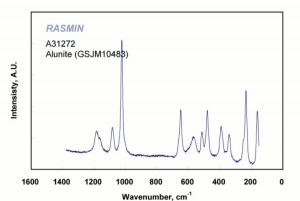Alunite
Jump to navigation
Jump to search
Description
A pale pink to grayish mineral that occurs naturally in volcanic rocks. Alunite was first called aluminilite by J.C. Delametherie in 1707, but the name was shortened to alunite. The off-white to yellowish stone is composed of Aluminum potassium sulfate and is found in the U.S. (Utah, California, Arizona, Colorado, Nevada, Washington), Spain (Almería), Ulkraine (Beregovo), Italy (Tolfa, Tuscany), France, Mexico, and Australia (New South Wales). It is has numerous uses including dye mordanting and leather tanning. For many years, alunite was a primary source for Potash and Alumina.
Synonyms and Related Terms
alumstone; aluminilite; Roman alum; roche alum; aluminum potassium sulfate; rock alum; Alunit (Deut.); alunita (Esp.); alunite (Port.); Aluniet (Ned.)
Physical and Chemical Properties
- Luster = vitreous to pearly;
- Streak = white
| Composition | KAl3(OH)6(SO4)3 |
|---|---|
| Mohs Hardness | 3.5-4.0 |
| Density | 2.58-2.75 g/ml |
| Molecular Weight | mol. wt. = 258.21 |
Resources and Citations
- G.S.Brady, Materials Handbook, McGraw-Hill Book Co., New York, 1971
- Richard S. Lewis, Hawley's Condensed Chemical Dictionary, Van Nostrand Reinhold, New York, 10th ed., 1993
- Van Nostrand's Scientific Encyclopedia, Douglas M. Considine (ed.), Van Nostrand Reinhold, New York, 1976
- Random House, Webster's Encyclopedic Unabridged Dictionary of the English Language, Grammercy Book, New York, 1997
- The American Heritage Dictionary or Encarta, via Microsoft Bookshelf 98, Microsoft Corp., 1998
- Encyclopedia Britannica, http://www.britannica.com Comment: "alunite"
- Wikipedia: http://en.wikipedia.org/wiki/Alunite

